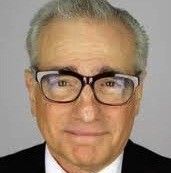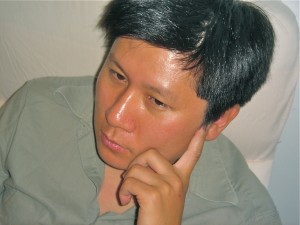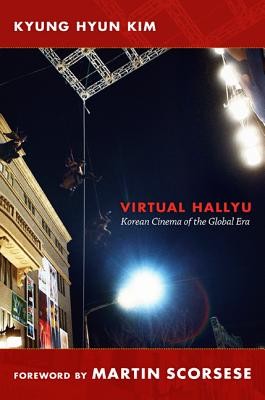
It's not often that an academic tome–even one related to film–snags a forward written by legendary filmmaker Martin Scorsese, whose latest movie Hugo coincidentally opens nationwide today.
But Kyung Hyun Kim, UC Irvine's associate professor of East Asian languages &
literatures and film & media studies, won those bragging rights, and like else everything in Hollywood it all started with the right connections.
]
“I first was introduced to Marty through Vera Farmiga, an actress
with whom I had worked when I was one of the producers of Never Forever,” Kim tells me, and he must be telling the truth because only Scorsese's friends get to call him Marty. “She had just shot Departed with
Marty, and she knew that he was very interested in Asian cinema.”

Departed, of course, is the 2006 remake of Hong Kong's Infernal Affairs, as well as the film that finally won Scorsese his first Academy Award for direction (before then, a crime if there ever was one.) Scorsese actually referenced Korean cinema in his Oscar acceptance speech.
Through Farmiga, Kim sent Scorsese his first book, Remasculinization of Korean Cinema. Scorsese, a Korean film buff (or, actually, a buff of all kinds of cinema), later invited Kim to lunch with him at his Upper East Side home in the fall of 2006.
“Our friendship began then,
as I noticed that he was really a gregarious Scillian and a kid at
heart,” recalls Kim. “He would invite me to his office in New York's [Directors Guild of America] buidling
whenever I was in town, and I would listen to his stories and him
mine about Korean films. Our taste in films actually overlap quite
a bit, and so it was very easy to talk to him. And we both also
have low tolerance for b.s.”
Their bond would strengthen over the years, with Scorsese asking Kim for film recommendations. “Every year, I sent him a list of DVDs of Korean and Asian
films for him to look at,” mentions Kim, who is also the director of UCI's critical theory emphasis. “The thing with Marty is he actually does
read my notes and watches them.”
But viewing The Housemaid, a Korean horror classic
from the 1960s, made Scorsese sad, not because of the story but the condition of the print. “He wanted to do more,” explains Kim, who got one of America's foremost film directors in contact with the Korean Film Archive. From there, Scorsese used
his influence with the World Cinema Foundation to invest 80,000
Euros for a restoration project that had each frame of film scanned and corrected. To give an idea what kind of task that is, Kim notes about 35,000 frames total 20
minutes of film.
[

His recently published book, Virtual Hallyu: Korean Cinema of the Global Era, explores the phenomenon of Korean cinema in the early 21st
century, when Asian films not only grossed millions of dollars, they outperformed their Hollywood counterparts at the box office.
In the forward to Kim's latest book, Scorsese writes that his friend's work “enlarges our vision of one of the great national cinematic flowerings
of the last decade.”
Kim, meanwhile, credits Scorsese for helping to expand Korean cinema's reach to these shores. “He has made more people aware that the Korean film industry
is a vibrant one and is no longer just a land marked by
war, destruction and Cold War remnants,” he says of his ol' pal Marty.
By the way, I attended the opening night of the Busan West International Film Festival at Chapman University recently before communicating with Kim or knowing he was also there. (I wrote about the event here: “Bong Joon-ho Opens Busan West Festival at Chapman University with 3D Version of The Host“.) Kim went because he wanted to meet up with the evening's Icon Award honoree, director Bong Joon-ho.
“He also likes the films featured in my book,” Kim remarks, “and I do
have a lengthy discussion on The Host, one of his from 2006.”
Before a new 3D version of The Host rolled that magical night, Bong noted that one of his early influences was Scorsese.

OC Weekly Editor-in-Chief Matt Coker has been engaging, enraging and entertaining readers of newspapers, magazines and websites for decades. He spent the first 13 years of his career in journalism at daily newspapers before “graduating” to OC Weekly in 1995 as the alternative newsweekly’s first calendar editor.

